NX9410: Corporate Governance Issues at Tesco PLC in 2014 Report
VerifiedAdded on 2022/12/23
|19
|2482
|39
Report
AI Summary
This report provides a detailed analysis of the corporate governance issues that plagued Tesco PLC in 2014. It begins with an executive summary and introduction, outlining the context of the scandal and the importance of corporate governance. The methodology section describes the data collection methods used. The core of the report focuses on three key problems: a lack of expertise within the board of directors, the absence of strong leadership, and a lack of scrutiny from the audit committee. Each problem is explored in detail, supported by evidence and references to relevant literature and corporate governance principles. The report then presents recommendations for improvements, emphasizing the need for experienced board members, strong leadership, and rigorous scrutiny. Appendices provide supporting documents, including organizational charts, board structures, share price data, ethics forms, and presentations. The report concludes by summarizing the key findings and reiterating the importance of robust corporate governance in preventing similar issues in the future.
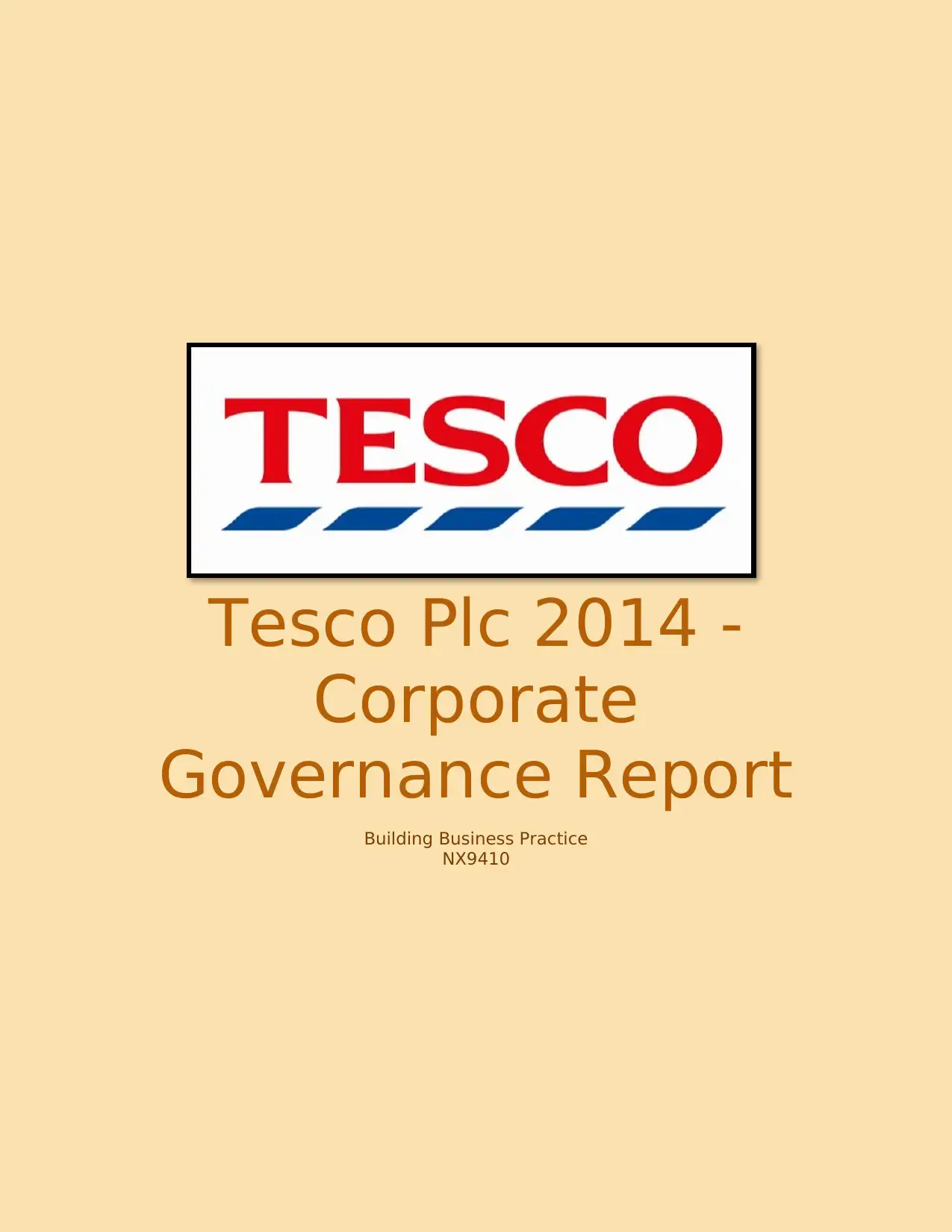
Tesco Plc 2014 -
Corporate
Governance Report
Building Business Practice
NX9410
Corporate
Governance Report
Building Business Practice
NX9410
Paraphrase This Document
Need a fresh take? Get an instant paraphrase of this document with our AI Paraphraser
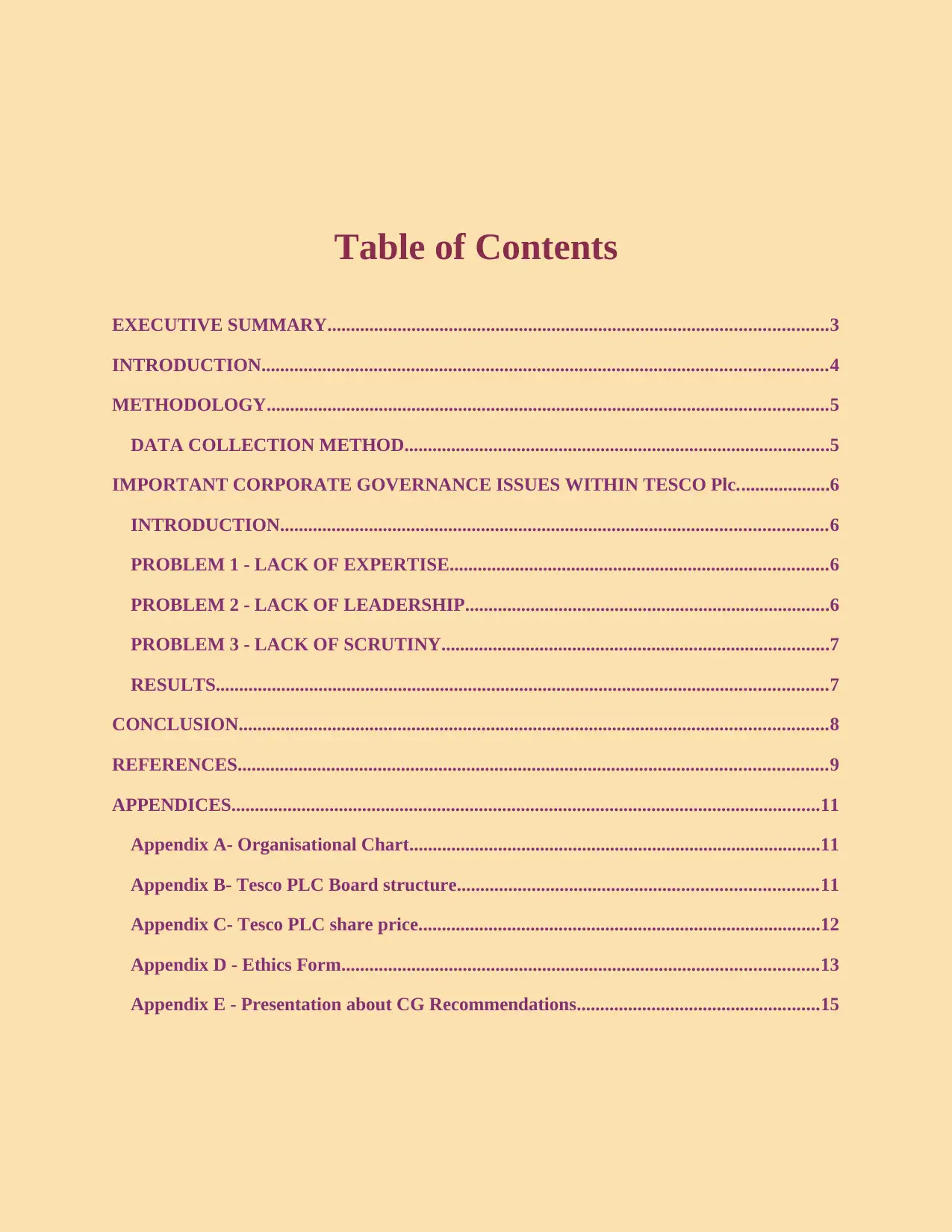
Table of Contents
EXECUTIVE SUMMARY...........................................................................................................3
INTRODUCTION.........................................................................................................................4
METHODOLOGY........................................................................................................................5
DATA COLLECTION METHOD...........................................................................................5
IMPORTANT CORPORATE GOVERNANCE ISSUES WITHIN TESCO Plc....................6
INTRODUCTION.....................................................................................................................6
PROBLEM 1 - LACK OF EXPERTISE.................................................................................6
PROBLEM 2 - LACK OF LEADERSHIP..............................................................................6
PROBLEM 3 - LACK OF SCRUTINY...................................................................................7
RESULTS...................................................................................................................................7
CONCLUSION..............................................................................................................................8
REFERENCES..............................................................................................................................9
APPENDICES..............................................................................................................................11
Appendix A- Organisational Chart........................................................................................11
Appendix B- Tesco PLC Board structure.............................................................................11
Appendix C- Tesco PLC share price......................................................................................12
Appendix D - Ethics Form......................................................................................................13
Appendix E - Presentation about CG Recommendations....................................................15
EXECUTIVE SUMMARY...........................................................................................................3
INTRODUCTION.........................................................................................................................4
METHODOLOGY........................................................................................................................5
DATA COLLECTION METHOD...........................................................................................5
IMPORTANT CORPORATE GOVERNANCE ISSUES WITHIN TESCO Plc....................6
INTRODUCTION.....................................................................................................................6
PROBLEM 1 - LACK OF EXPERTISE.................................................................................6
PROBLEM 2 - LACK OF LEADERSHIP..............................................................................6
PROBLEM 3 - LACK OF SCRUTINY...................................................................................7
RESULTS...................................................................................................................................7
CONCLUSION..............................................................................................................................8
REFERENCES..............................................................................................................................9
APPENDICES..............................................................................................................................11
Appendix A- Organisational Chart........................................................................................11
Appendix B- Tesco PLC Board structure.............................................................................11
Appendix C- Tesco PLC share price......................................................................................12
Appendix D - Ethics Form......................................................................................................13
Appendix E - Presentation about CG Recommendations....................................................15

⊘ This is a preview!⊘
Do you want full access?
Subscribe today to unlock all pages.

Trusted by 1+ million students worldwide
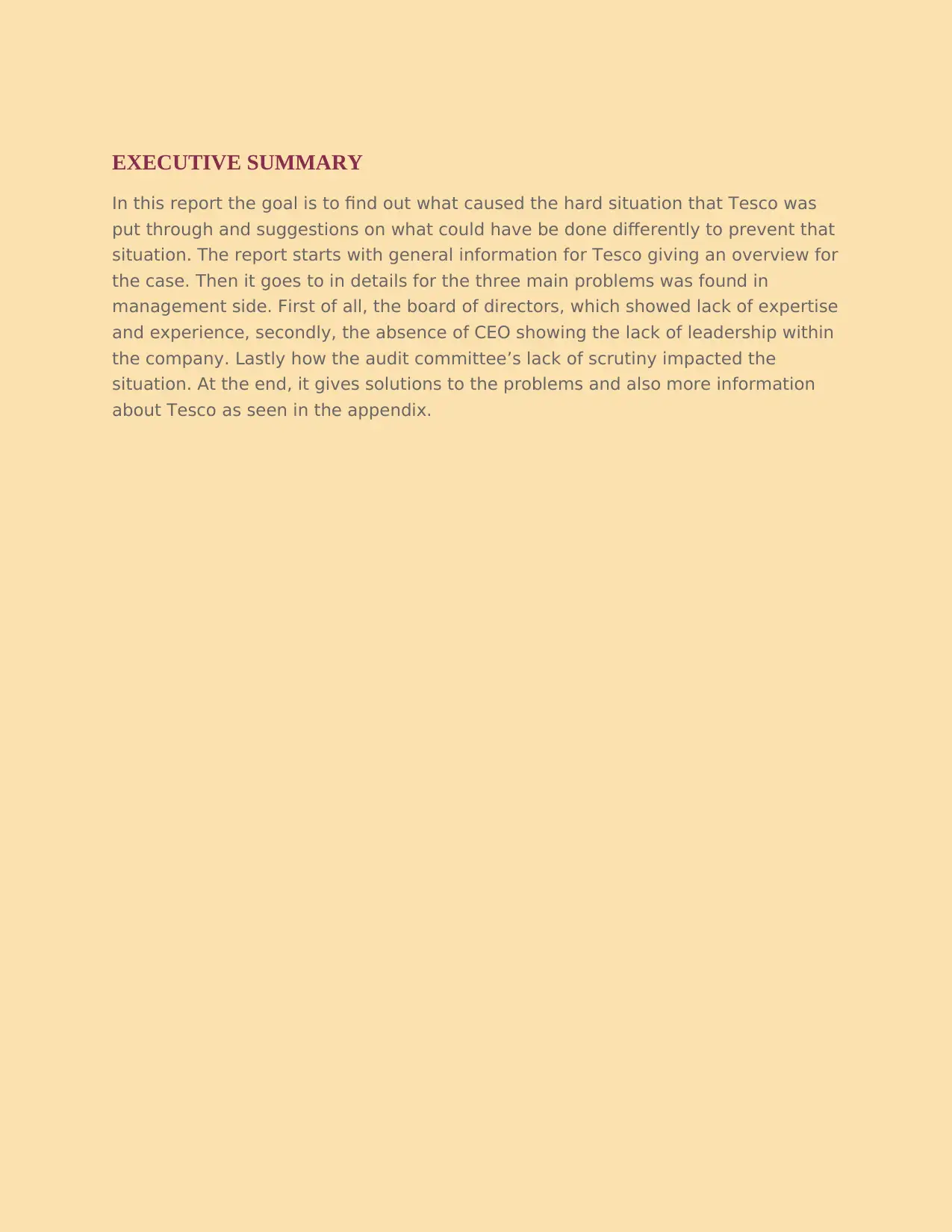
EXECUTIVE SUMMARY
In this report the goal is to find out what caused the hard situation that Tesco was
put through and suggestions on what could have be done differently to prevent that
situation. The report starts with general information for Tesco giving an overview for
the case. Then it goes to in details for the three main problems was found in
management side. First of all, the board of directors, which showed lack of expertise
and experience, secondly, the absence of CEO showing the lack of leadership within
the company. Lastly how the audit committee’s lack of scrutiny impacted the
situation. At the end, it gives solutions to the problems and also more information
about Tesco as seen in the appendix.
In this report the goal is to find out what caused the hard situation that Tesco was
put through and suggestions on what could have be done differently to prevent that
situation. The report starts with general information for Tesco giving an overview for
the case. Then it goes to in details for the three main problems was found in
management side. First of all, the board of directors, which showed lack of expertise
and experience, secondly, the absence of CEO showing the lack of leadership within
the company. Lastly how the audit committee’s lack of scrutiny impacted the
situation. At the end, it gives solutions to the problems and also more information
about Tesco as seen in the appendix.
Paraphrase This Document
Need a fresh take? Get an instant paraphrase of this document with our AI Paraphraser
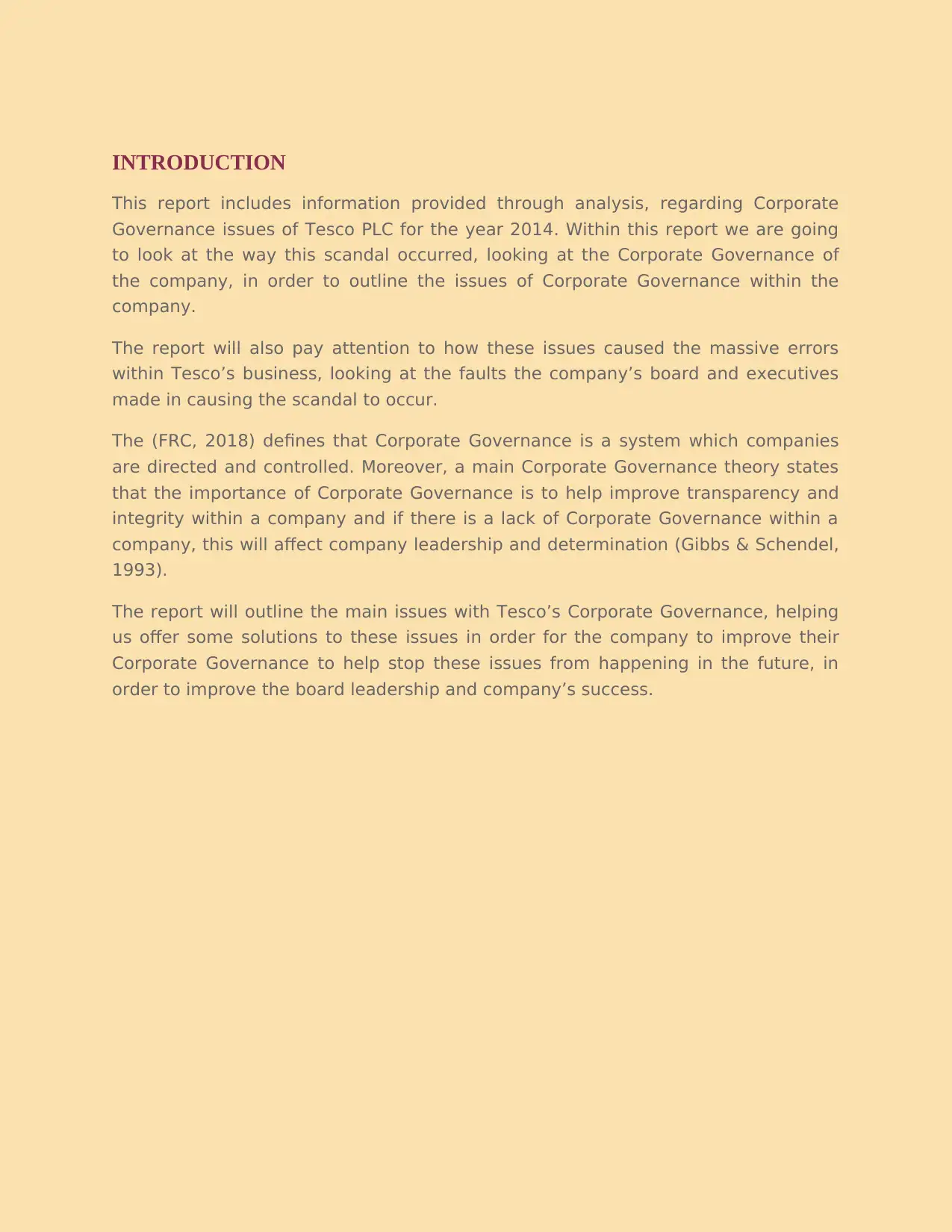
INTRODUCTION
This report includes information provided through analysis, regarding Corporate
Governance issues of Tesco PLC for the year 2014. Within this report we are going
to look at the way this scandal occurred, looking at the Corporate Governance of
the company, in order to outline the issues of Corporate Governance within the
company.
The report will also pay attention to how these issues caused the massive errors
within Tesco’s business, looking at the faults the company’s board and executives
made in causing the scandal to occur.
The (FRC, 2018) defines that Corporate Governance is a system which companies
are directed and controlled. Moreover, a main Corporate Governance theory states
that the importance of Corporate Governance is to help improve transparency and
integrity within a company and if there is a lack of Corporate Governance within a
company, this will affect company leadership and determination (Gibbs & Schendel,
1993).
The report will outline the main issues with Tesco’s Corporate Governance, helping
us offer some solutions to these issues in order for the company to improve their
Corporate Governance to help stop these issues from happening in the future, in
order to improve the board leadership and company’s success.
This report includes information provided through analysis, regarding Corporate
Governance issues of Tesco PLC for the year 2014. Within this report we are going
to look at the way this scandal occurred, looking at the Corporate Governance of
the company, in order to outline the issues of Corporate Governance within the
company.
The report will also pay attention to how these issues caused the massive errors
within Tesco’s business, looking at the faults the company’s board and executives
made in causing the scandal to occur.
The (FRC, 2018) defines that Corporate Governance is a system which companies
are directed and controlled. Moreover, a main Corporate Governance theory states
that the importance of Corporate Governance is to help improve transparency and
integrity within a company and if there is a lack of Corporate Governance within a
company, this will affect company leadership and determination (Gibbs & Schendel,
1993).
The report will outline the main issues with Tesco’s Corporate Governance, helping
us offer some solutions to these issues in order for the company to improve their
Corporate Governance to help stop these issues from happening in the future, in
order to improve the board leadership and company’s success.

⊘ This is a preview!⊘
Do you want full access?
Subscribe today to unlock all pages.

Trusted by 1+ million students worldwide
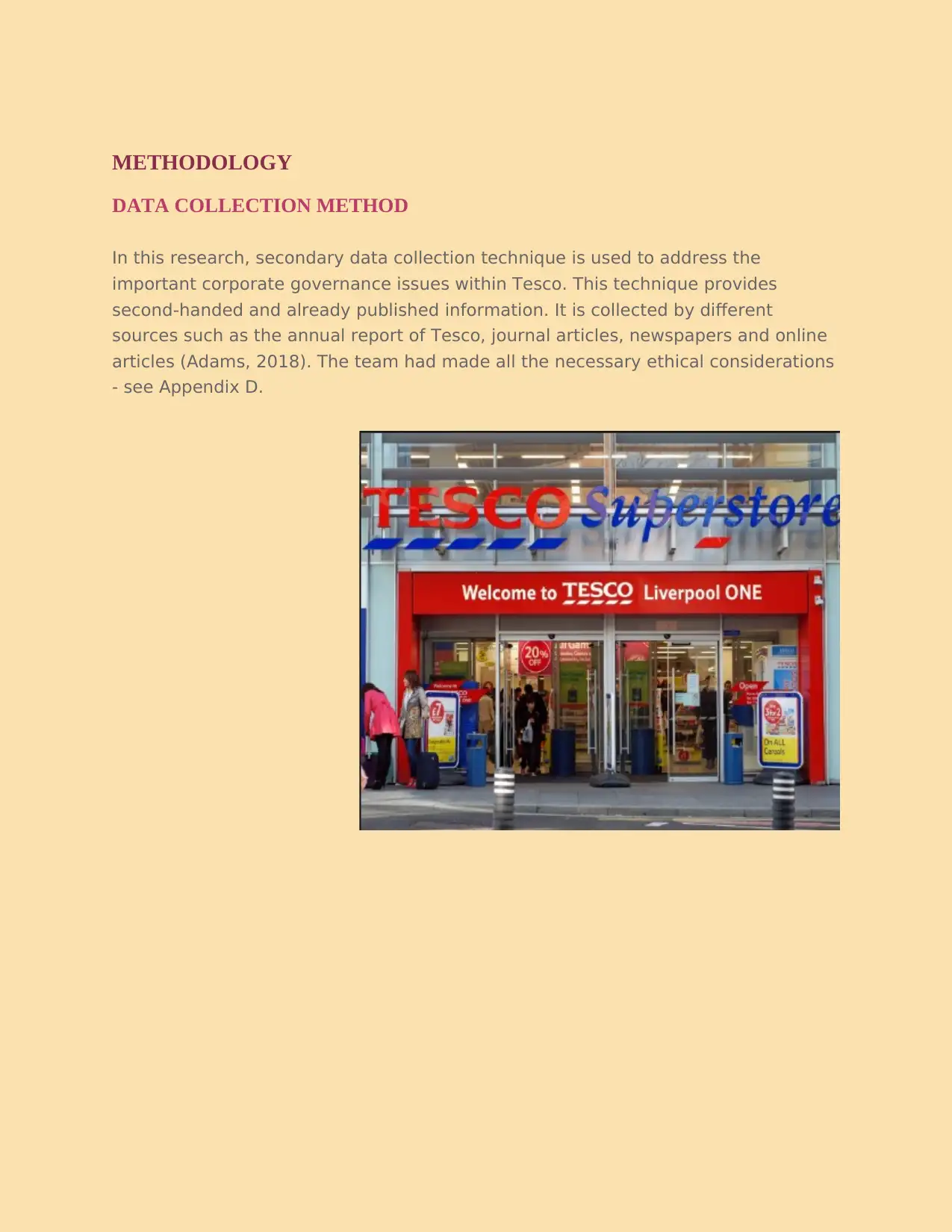
METHODOLOGY
DATA COLLECTION METHOD
In this research, secondary data collection technique is used to address the
important corporate governance issues within Tesco. This technique provides
second-handed and already published information. It is collected by different
sources such as the annual report of Tesco, journal articles, newspapers and online
articles (Adams, 2018). The team had made all the necessary ethical considerations
- see Appendix D.
DATA COLLECTION METHOD
In this research, secondary data collection technique is used to address the
important corporate governance issues within Tesco. This technique provides
second-handed and already published information. It is collected by different
sources such as the annual report of Tesco, journal articles, newspapers and online
articles (Adams, 2018). The team had made all the necessary ethical considerations
- see Appendix D.
Paraphrase This Document
Need a fresh take? Get an instant paraphrase of this document with our AI Paraphraser
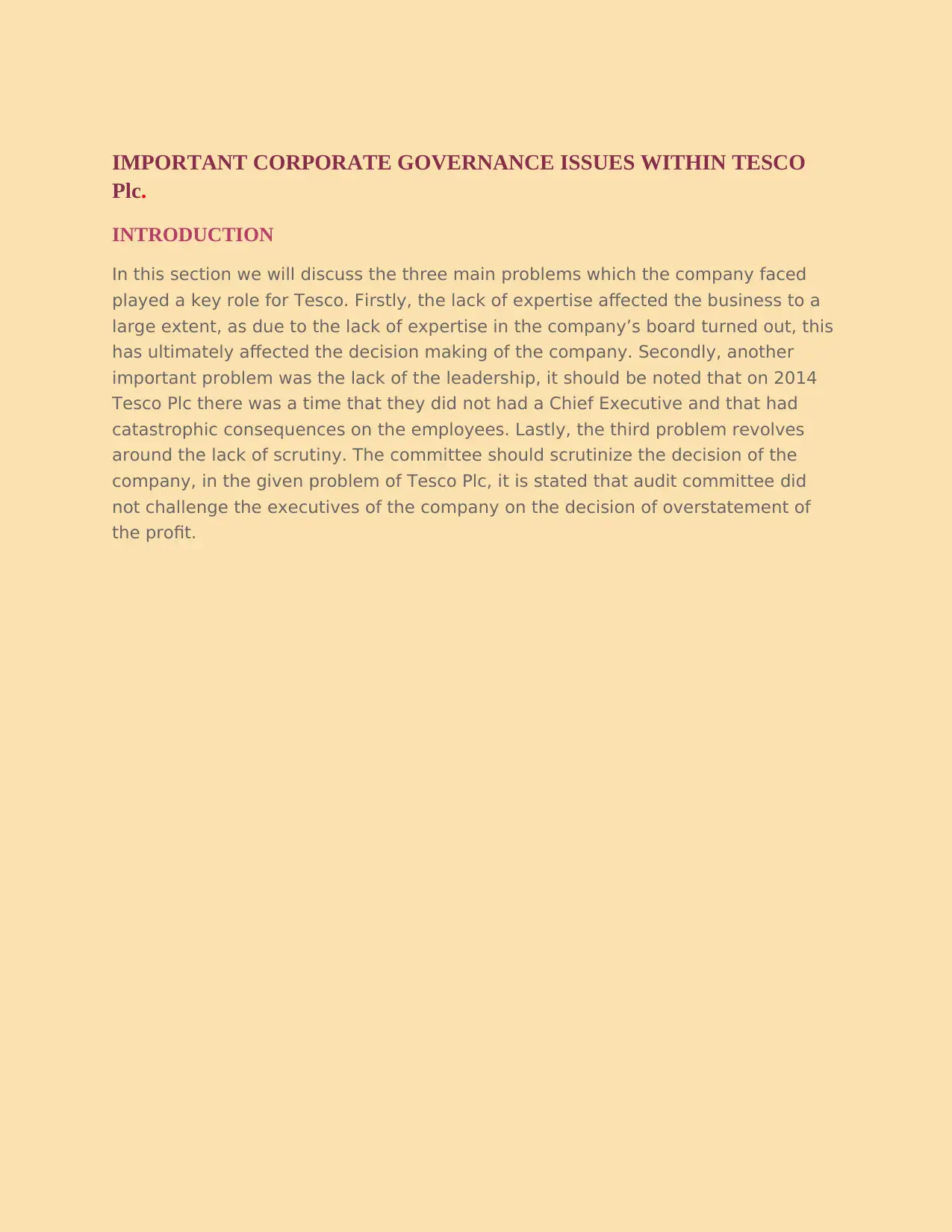
IMPORTANT CORPORATE GOVERNANCE ISSUES WITHIN TESCO
Plc.
INTRODUCTION
In this section we will discuss the three main problems which the company faced
played a key role for Tesco. Firstly, the lack of expertise affected the business to a
large extent, as due to the lack of expertise in the company’s board turned out, this
has ultimately affected the decision making of the company. Secondly, another
important problem was the lack of the leadership, it should be noted that on 2014
Tesco Plc there was a time that they did not had a Chief Executive and that had
catastrophic consequences on the employees. Lastly, the third problem revolves
around the lack of scrutiny. The committee should scrutinize the decision of the
company, in the given problem of Tesco Plc, it is stated that audit committee did
not challenge the executives of the company on the decision of overstatement of
the profit.
Plc.
INTRODUCTION
In this section we will discuss the three main problems which the company faced
played a key role for Tesco. Firstly, the lack of expertise affected the business to a
large extent, as due to the lack of expertise in the company’s board turned out, this
has ultimately affected the decision making of the company. Secondly, another
important problem was the lack of the leadership, it should be noted that on 2014
Tesco Plc there was a time that they did not had a Chief Executive and that had
catastrophic consequences on the employees. Lastly, the third problem revolves
around the lack of scrutiny. The committee should scrutinize the decision of the
company, in the given problem of Tesco Plc, it is stated that audit committee did
not challenge the executives of the company on the decision of overstatement of
the profit.

⊘ This is a preview!⊘
Do you want full access?
Subscribe today to unlock all pages.

Trusted by 1+ million students worldwide
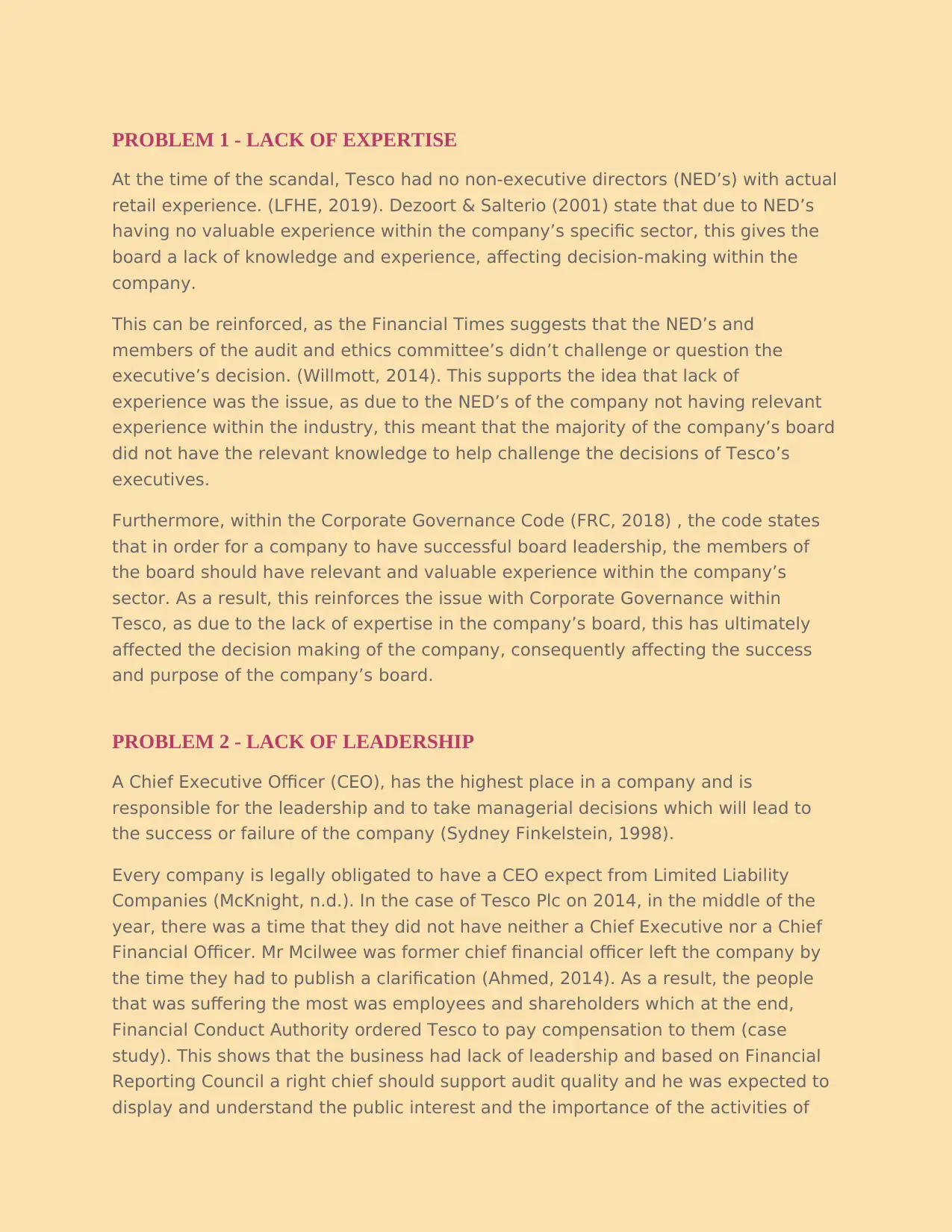
PROBLEM 1 - LACK OF EXPERTISE
At the time of the scandal, Tesco had no non-executive directors (NED’s) with actual
retail experience. (LFHE, 2019). Dezoort & Salterio (2001) state that due to NED’s
having no valuable experience within the company’s specific sector, this gives the
board a lack of knowledge and experience, affecting decision-making within the
company.
This can be reinforced, as the Financial Times suggests that the NED’s and
members of the audit and ethics committee’s didn’t challenge or question the
executive’s decision. (Willmott, 2014). This supports the idea that lack of
experience was the issue, as due to the NED’s of the company not having relevant
experience within the industry, this meant that the majority of the company’s board
did not have the relevant knowledge to help challenge the decisions of Tesco’s
executives.
Furthermore, within the Corporate Governance Code (FRC, 2018) , the code states
that in order for a company to have successful board leadership, the members of
the board should have relevant and valuable experience within the company’s
sector. As a result, this reinforces the issue with Corporate Governance within
Tesco, as due to the lack of expertise in the company’s board, this has ultimately
affected the decision making of the company, consequently affecting the success
and purpose of the company’s board.
PROBLEM 2 - LACK OF LEADERSHIP
A Chief Executive Officer (CEO), has the highest place in a company and is
responsible for the leadership and to take managerial decisions which will lead to
the success or failure of the company (Sydney Finkelstein, 1998).
Every company is legally obligated to have a CEO expect from Limited Liability
Companies (McKnight, n.d.). In the case of Tesco Plc on 2014, in the middle of the
year, there was a time that they did not have neither a Chief Executive nor a Chief
Financial Officer. Mr Mcilwee was former chief financial officer left the company by
the time they had to publish a clarification (Ahmed, 2014). As a result, the people
that was suffering the most was employees and shareholders which at the end,
Financial Conduct Authority ordered Tesco to pay compensation to them (case
study). This shows that the business had lack of leadership and based on Financial
Reporting Council a right chief should support audit quality and he was expected to
display and understand the public interest and the importance of the activities of
At the time of the scandal, Tesco had no non-executive directors (NED’s) with actual
retail experience. (LFHE, 2019). Dezoort & Salterio (2001) state that due to NED’s
having no valuable experience within the company’s specific sector, this gives the
board a lack of knowledge and experience, affecting decision-making within the
company.
This can be reinforced, as the Financial Times suggests that the NED’s and
members of the audit and ethics committee’s didn’t challenge or question the
executive’s decision. (Willmott, 2014). This supports the idea that lack of
experience was the issue, as due to the NED’s of the company not having relevant
experience within the industry, this meant that the majority of the company’s board
did not have the relevant knowledge to help challenge the decisions of Tesco’s
executives.
Furthermore, within the Corporate Governance Code (FRC, 2018) , the code states
that in order for a company to have successful board leadership, the members of
the board should have relevant and valuable experience within the company’s
sector. As a result, this reinforces the issue with Corporate Governance within
Tesco, as due to the lack of expertise in the company’s board, this has ultimately
affected the decision making of the company, consequently affecting the success
and purpose of the company’s board.
PROBLEM 2 - LACK OF LEADERSHIP
A Chief Executive Officer (CEO), has the highest place in a company and is
responsible for the leadership and to take managerial decisions which will lead to
the success or failure of the company (Sydney Finkelstein, 1998).
Every company is legally obligated to have a CEO expect from Limited Liability
Companies (McKnight, n.d.). In the case of Tesco Plc on 2014, in the middle of the
year, there was a time that they did not have neither a Chief Executive nor a Chief
Financial Officer. Mr Mcilwee was former chief financial officer left the company by
the time they had to publish a clarification (Ahmed, 2014). As a result, the people
that was suffering the most was employees and shareholders which at the end,
Financial Conduct Authority ordered Tesco to pay compensation to them (case
study). This shows that the business had lack of leadership and based on Financial
Reporting Council a right chief should support audit quality and he was expected to
display and understand the public interest and the importance of the activities of
Paraphrase This Document
Need a fresh take? Get an instant paraphrase of this document with our AI Paraphraser
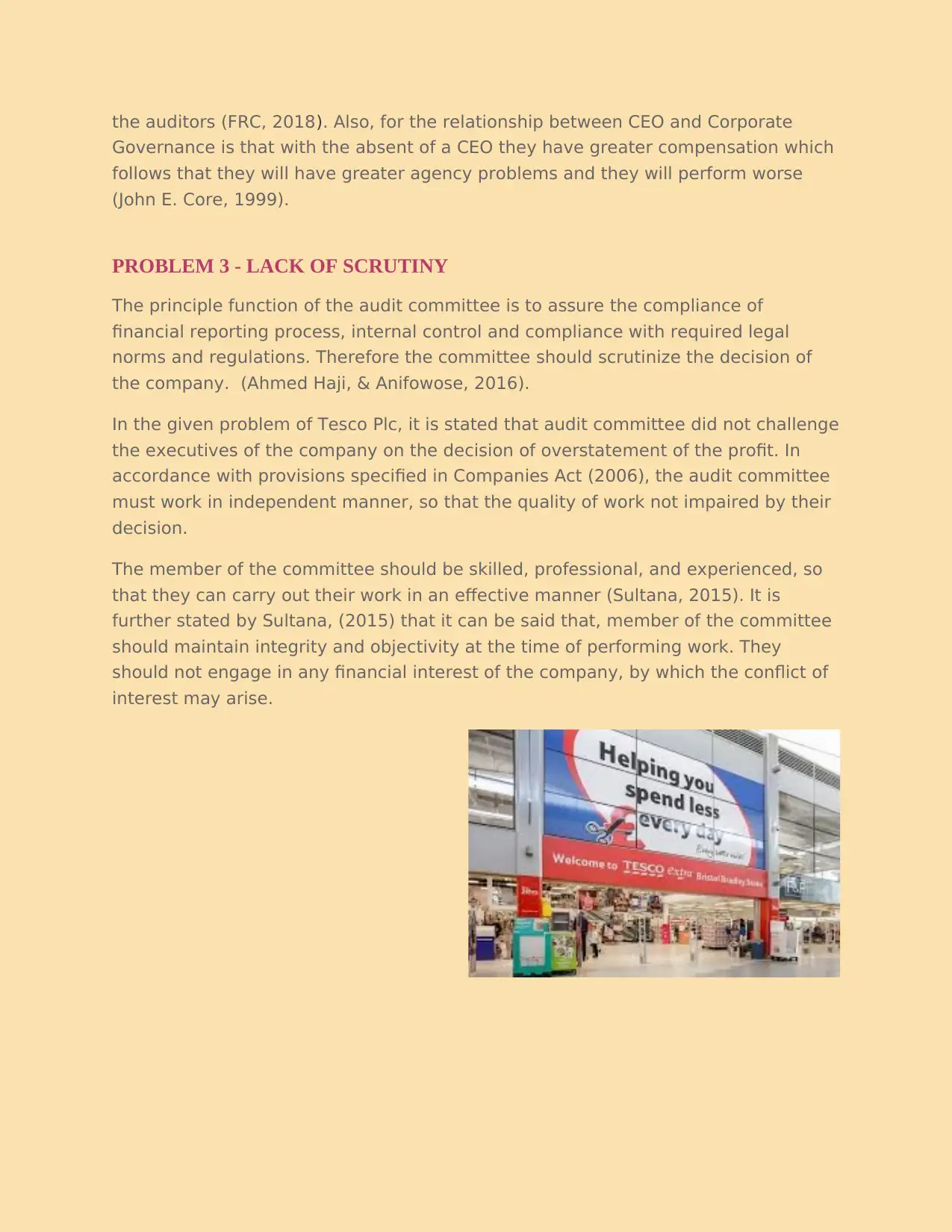
the auditors (FRC, 2018). Also, for the relationship between CEO and Corporate
Governance is that with the absent of a CEO they have greater compensation which
follows that they will have greater agency problems and they will perform worse
(John E. Core, 1999).
PROBLEM 3 - LACK OF SCRUTINY
The principle function of the audit committee is to assure the compliance of
financial reporting process, internal control and compliance with required legal
norms and regulations. Therefore the committee should scrutinize the decision of
the company. (Ahmed Haji, & Anifowose, 2016).
In the given problem of Tesco Plc, it is stated that audit committee did not challenge
the executives of the company on the decision of overstatement of the profit. In
accordance with provisions specified in Companies Act (2006), the audit committee
must work in independent manner, so that the quality of work not impaired by their
decision.
The member of the committee should be skilled, professional, and experienced, so
that they can carry out their work in an effective manner (Sultana, 2015). It is
further stated by Sultana, (2015) that it can be said that, member of the committee
should maintain integrity and objectivity at the time of performing work. They
should not engage in any financial interest of the company, by which the conflict of
interest may arise.
Governance is that with the absent of a CEO they have greater compensation which
follows that they will have greater agency problems and they will perform worse
(John E. Core, 1999).
PROBLEM 3 - LACK OF SCRUTINY
The principle function of the audit committee is to assure the compliance of
financial reporting process, internal control and compliance with required legal
norms and regulations. Therefore the committee should scrutinize the decision of
the company. (Ahmed Haji, & Anifowose, 2016).
In the given problem of Tesco Plc, it is stated that audit committee did not challenge
the executives of the company on the decision of overstatement of the profit. In
accordance with provisions specified in Companies Act (2006), the audit committee
must work in independent manner, so that the quality of work not impaired by their
decision.
The member of the committee should be skilled, professional, and experienced, so
that they can carry out their work in an effective manner (Sultana, 2015). It is
further stated by Sultana, (2015) that it can be said that, member of the committee
should maintain integrity and objectivity at the time of performing work. They
should not engage in any financial interest of the company, by which the conflict of
interest may arise.
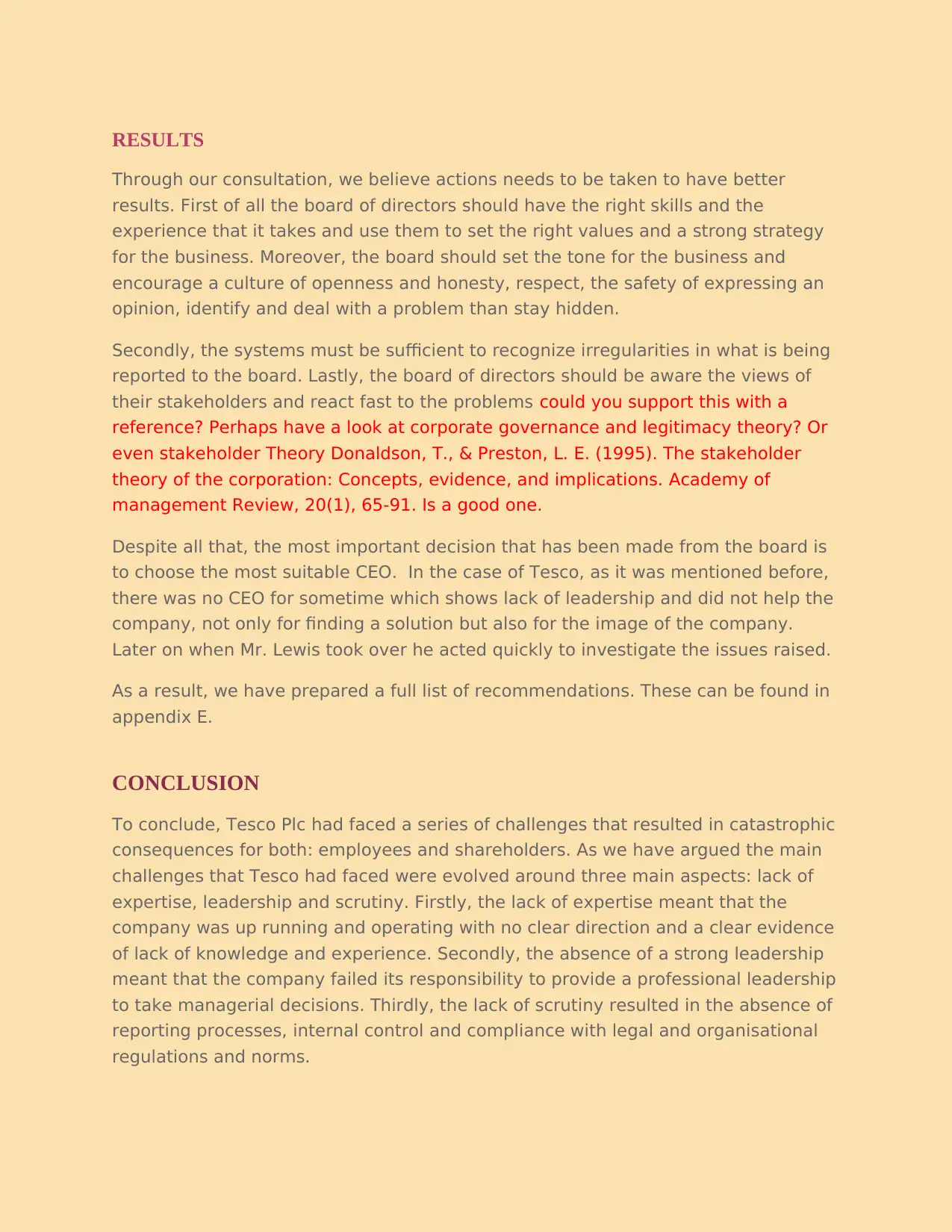
RESULTS
Through our consultation, we believe actions needs to be taken to have better
results. First of all the board of directors should have the right skills and the
experience that it takes and use them to set the right values and a strong strategy
for the business. Moreover, the board should set the tone for the business and
encourage a culture of openness and honesty, respect, the safety of expressing an
opinion, identify and deal with a problem than stay hidden.
Secondly, the systems must be sufficient to recognize irregularities in what is being
reported to the board. Lastly, the board of directors should be aware the views of
their stakeholders and react fast to the problems could you support this with a
reference? Perhaps have a look at corporate governance and legitimacy theory? Or
even stakeholder Theory Donaldson, T., & Preston, L. E. (1995). The stakeholder
theory of the corporation: Concepts, evidence, and implications. Academy of
management Review, 20(1), 65-91. Is a good one.
Despite all that, the most important decision that has been made from the board is
to choose the most suitable CEO. In the case of Tesco, as it was mentioned before,
there was no CEO for sometime which shows lack of leadership and did not help the
company, not only for finding a solution but also for the image of the company.
Later on when Mr. Lewis took over he acted quickly to investigate the issues raised.
As a result, we have prepared a full list of recommendations. These can be found in
appendix E.
CONCLUSION
To conclude, Tesco Plc had faced a series of challenges that resulted in catastrophic
consequences for both: employees and shareholders. As we have argued the main
challenges that Tesco had faced were evolved around three main aspects: lack of
expertise, leadership and scrutiny. Firstly, the lack of expertise meant that the
company was up running and operating with no clear direction and a clear evidence
of lack of knowledge and experience. Secondly, the absence of a strong leadership
meant that the company failed its responsibility to provide a professional leadership
to take managerial decisions. Thirdly, the lack of scrutiny resulted in the absence of
reporting processes, internal control and compliance with legal and organisational
regulations and norms.
Through our consultation, we believe actions needs to be taken to have better
results. First of all the board of directors should have the right skills and the
experience that it takes and use them to set the right values and a strong strategy
for the business. Moreover, the board should set the tone for the business and
encourage a culture of openness and honesty, respect, the safety of expressing an
opinion, identify and deal with a problem than stay hidden.
Secondly, the systems must be sufficient to recognize irregularities in what is being
reported to the board. Lastly, the board of directors should be aware the views of
their stakeholders and react fast to the problems could you support this with a
reference? Perhaps have a look at corporate governance and legitimacy theory? Or
even stakeholder Theory Donaldson, T., & Preston, L. E. (1995). The stakeholder
theory of the corporation: Concepts, evidence, and implications. Academy of
management Review, 20(1), 65-91. Is a good one.
Despite all that, the most important decision that has been made from the board is
to choose the most suitable CEO. In the case of Tesco, as it was mentioned before,
there was no CEO for sometime which shows lack of leadership and did not help the
company, not only for finding a solution but also for the image of the company.
Later on when Mr. Lewis took over he acted quickly to investigate the issues raised.
As a result, we have prepared a full list of recommendations. These can be found in
appendix E.
CONCLUSION
To conclude, Tesco Plc had faced a series of challenges that resulted in catastrophic
consequences for both: employees and shareholders. As we have argued the main
challenges that Tesco had faced were evolved around three main aspects: lack of
expertise, leadership and scrutiny. Firstly, the lack of expertise meant that the
company was up running and operating with no clear direction and a clear evidence
of lack of knowledge and experience. Secondly, the absence of a strong leadership
meant that the company failed its responsibility to provide a professional leadership
to take managerial decisions. Thirdly, the lack of scrutiny resulted in the absence of
reporting processes, internal control and compliance with legal and organisational
regulations and norms.
⊘ This is a preview!⊘
Do you want full access?
Subscribe today to unlock all pages.

Trusted by 1+ million students worldwide
1 out of 19
Related Documents
Your All-in-One AI-Powered Toolkit for Academic Success.
+13062052269
info@desklib.com
Available 24*7 on WhatsApp / Email
![[object Object]](/_next/static/media/star-bottom.7253800d.svg)
Unlock your academic potential
Copyright © 2020–2025 A2Z Services. All Rights Reserved. Developed and managed by ZUCOL.




